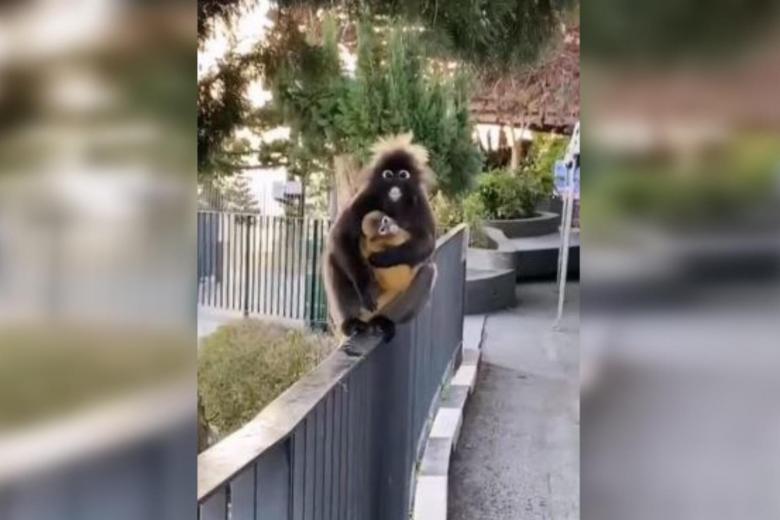GEORGE TOWN (THE STAR/ASIA NEWS NETWORK) - With humans cooped up in their homes during the Covid-19 pandemic, wild animals are coming out of their habitats and adjusting to a world relatively free of people.
Since the start of Malaysia's movement control order (MCO) on Jan 13, popular tourist spots in Penang have been devoid of human movement and in places like Penang Hill, dusky leaf monkeys have been spotted roaming around freely.
A video of two of the monkeys with their babies at Penang Hill's upper station was posted on Penang Hill's Facebook page and went viral.
One of the monkeys is seen foraging for food with its gold-coloured baby on its lap while another, cuddling its baby tightly, jumps from a tree branch.
Penang Hill Corporation general manager Cheok Lay Leng said the monkeys are roaming freely as there are no visitors at Penang Hill during MCO 2.0.
"It's nice to see nature taking over for a change. It's quite common to see dusky leaf monkeys around, but it's rare to see them with their babies, " he said.
Also known as the spectacled langur, dusky leaf monkeys are called "lutong" in Bahasa Malaysia and are a protected species.
They are known as spectacled leaf monkeys because of the large white circles around their eyes, which make them look like they are wearing glasses.
Malaysian Primatological Society vice-president Nadine Ruppert said the dusky langurs were classified as endangered in the IUCN Red List of Threatened Species.
"In Penang, they can be found all over the island, especially in Teluk Bahang. So far, we don't have any numbers for this species here but they are definitely affected by habitat loss.
"They usually live in small family groups of around 10 individuals and they are also quite territorial.
"When their habitat is affected, these monkeys will try to look for new suitable habitat sites with no other groups, " she added.
Dr Ruppert noted that if the dusky langurs fail to find a suitable new habitat, they were at risk of perishing.
"Sadly, their charismatic yellow babies are one of the most traded illegal wildlife specimens and they die very quickly when in captivity, " she said.
She advises against feeding them due to public health concerns.
"Primates can also get Covid-19 and other infectious diseases, and so it's best not to get too close to them, " she added.
In Perak, a video of a female elephant trespassing into the compound of a school near Gerik last Tuesday (Jan 19) also went viral.
The wild elephant, aged between 30 and 35, wandered into the school grounds, damaging the electric fence, but no one was injured.
National news agency Bernama reported that the Perak National Parks and Wildlife Department installed the electric fence last November to prevent wild elephants from entering the compound.

